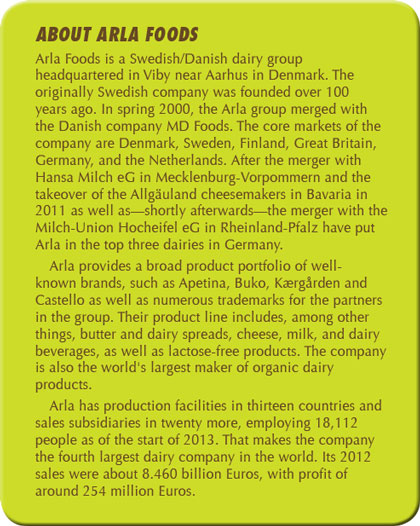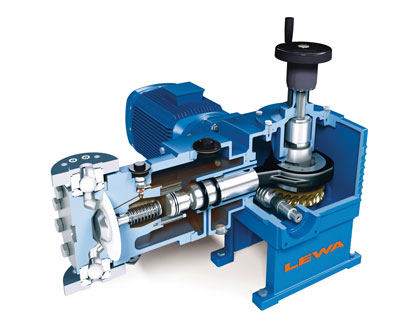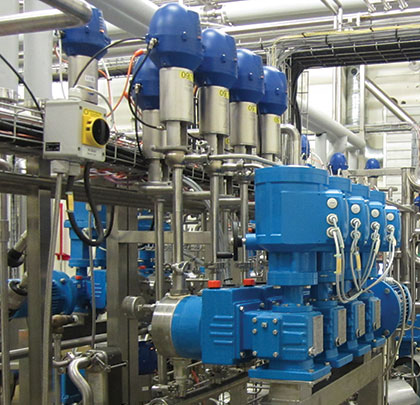Spreadable butter is one of the primary products of the Danish/Swedish dairy company Arla. At their facility in Götene Arla is producing the brand Bregott for the domestic market in Sweden. To be able to reproduce the specific characteristics of the different types exactly, ingredients must be precisely metered. For ten years, the production facility in Götene has used pumps from Lewa GmbH for this purpose, which are not only designed for high discharge pressures but also have an accuracy of ± 1 percent, meeting the manufacturer’s strict requirements. From the different variants of the Ecoflow pumps, which are also very suitable for the production of food items, Lewa was able to configure a perfect solution for Arla in 2010.

During a visit to the Arla plant in Götene at the start of 2013, the responsible Lewa product manager Jörg Sommer (right), got an idea of how the basic ingredients of water, rapeseed oil, and brine are processed to make spreadable butter. Bertil Holmstedt (left), technician, and Klas Erikson, maintenance team leader at Arla Foods Götene/Sweden, were quite satisfied: “These pumps not only satisfy the strictest of hygienic demands, but also meter very precisely.”
TEAMING WITH ARLA
Water, rapeseed oil, and brine—those are the most important, exclusively natural ingredients to give the butter Arla produces in Götene, Sweden its medley salty flavor and its spreadable consistency. The mixing system for the plant must meet the strictest of hygienic requirements and—even more importantly—meter with high precision to ensure consistent product quality. Since the Ecoflow pumps from the Leonberg manufacturer Lewa stand out not only for the fact that they are suitable for high discharge pressures, but also because they ensure good reproducibility, about thirty of them were installed in different plants, including nine diaphragm pumps and one packed plunger pump in the facility in Götene.
In line with the modular principle, different drives were combined, each with two to six pump heads. With the Ecoflow, up to 1320.86 gallons (6 cubic meters) per hour per pump head can be conveyed. The discharge pressure supported can reach up to 500 bar. Depending on the application, for Arla’s pumps the range is up to about 264.17 gallons (1 cubic meter) per hour and 15 bar.
Since the entire production facility runs at a highly automated level for both hygiene and efficiency, the pumps must be able to work nearly maintenance-free, so that the process chain needs to be interrupted as little as possible. “The pumps are in operation about twenty hours a day, although not all at one time. And they have to work at a reproducible metering accuracy of ±1 percent, says Klas Erikson, maintenance team leader at Arla Foods Götene/Sweden. “The strict requirements for precision and robustness that our application demands have been met by Ecoflow pumps to our complete satisfaction.”

DURABLE DIAPHRAGM METERING PUMPS FOR HYGIENIC APPLICATIONS
Thanks to the patented DPS Diaphragm Protection System, also used in the Ecoflow series, the diaphragm needs no positioning and the pumps can start reliably from any operating condition. The result is a high level of process reliability and resilience. The special technology permits an absolute suction pressure of up to 0.1 bar. So they keep working reliably even after operating errors or in case of extreme operating conditions, such as high suction pressure or a closed suction line.
Moreover, the pumps also have the advantage that the diaphragm can be changed quickly and easily. Automatic stroke adjustment and additional frequency control of the motor permits the large adjustment range of the pumps be regulated reliably and the entire process can be documented. The concept is extremely well-suited for the traceability of batches and the high quality requirements in today’s food industry.

Among other things, the Ecoflow pumps used at Arla/Götene are outstanding for their low dead space as well as their smooth stainless steel surfaces (1.4571). That makes the entire pump extremely well-suited for the food industry and for CIP cleaning.
MULTILAYERED DESIGN
“Aside from the usual standards for the food industry, we have also made sure that the pumps can easily be cleaned,” adds Erikson. Due to its minimal dead space and smooth stainless steel surfaces (1.4571), the entire pump is outstandingly well-suited for the food industry and for CIP cleaning. The hermetically sealed, oscillating diaphragm pumps are used, where high production quality and precise recipe settings must remain consistent over years. Due to their operational reliability and the high metering accuracy, the pump is also used for toxic, environmentally harmful, abrasive, viscous, sensitive, and expensive fluids. The diaphragm monitoring—in combination with the multilayered design of the sandwich diaphragm structure—reliably prevents any contamination of the product.
All components that come into contact with the medium are designed to be suitable for foods. When selecting the materials, Arla paid particular attention to the fact that the seals of the valves must remain elastic even after years of contact with the brine. Since salt has a corrosive effect over time, the decision was made to use Gylon, a type of Teflon. The diaphragm consists of pure PTFE, which is compatible with biological tissues. Due to the high energy efficiency, low maintenance costs, and long service lifetime of the sandwich diaphragms, the system costs and lifetime costs remain remarkably low. ■
About the Author
Jörg Sommer is the Ecoflow pumps product manager. Lewa GmbH was founded in 1952 as a family company by Herbert Ott and Rudolf Schestag, and today is the world’s leading manufacturer of metering and process diaphragm pumps as well as complete metering systems for process technology. For more information, email lewa@lewa.de or visit www.lewa.com.
MODERN PUMPING TODAY, December 2014
Did you enjoy this article?
Subscribe to the FREE Digital Edition of Modern Pumping Today Magazine!


